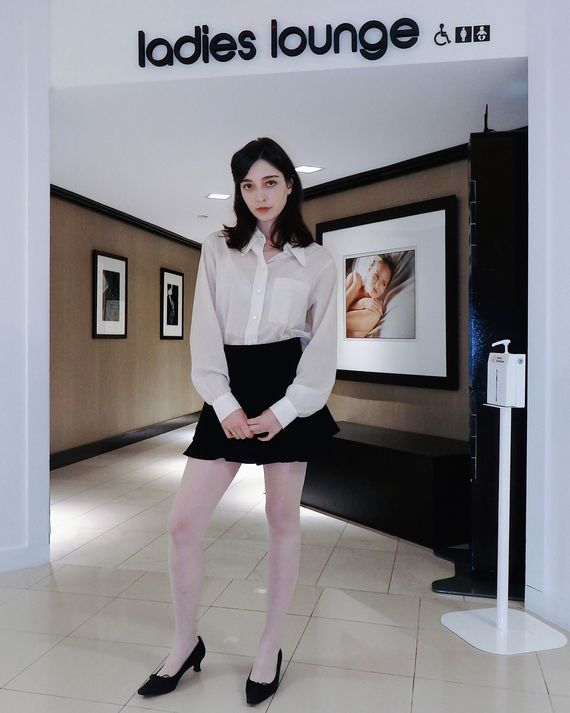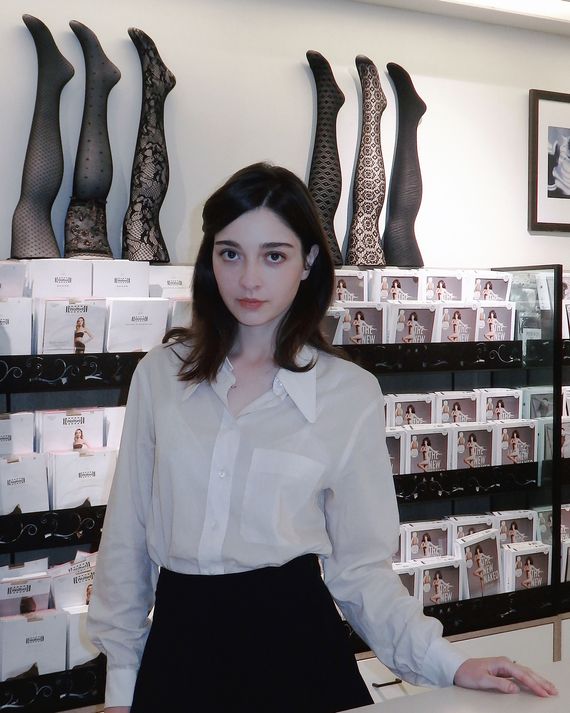
This article was featured in One Great Story, New York’s reading recommendation newsletter. Sign up here to get it nightly.
Amalia Ulman and I are being kicked out of Giorgio Armani. We’ve been sitting in two plush armchairs inside the designer’s empty midtown Bloomingdale’s outpost for about 30 minutes when a saleswoman suddenly appears. “Ladies, I’m sorry,” she says, smiling intensely to indicate her awareness that we have neither the intent nor the means to purchase Armani’s wares. “I think you might be more comfortable in the furniture department.” Ulman and I pack up our things and dutifully shuffle back to the department store’s bank of creaking elevators, then up to the sixth floor, where we settle into two decidedly less plush chairs, both advertised as 50 percent off. “I was comfortable,” Ulman says, after a beat.
The moment feels like it could have been lifted directly from Ulman’s debut film, El Planeta. In New York theaters September 24 before expanding to theaters around the country, it follows Leo and Maria, a mother and daughter (played by Ulman, 32, and her real-life mother, Alejandra Ulman) who refuse to acknowledge that they are about to be thrown out of their tiny apartment in Spain. They spend their days playing rich, draping themselves in zebra-print Moschino suits and fur coats and waltzing around their recession-ravaged seaside town charging fancy meals to the tab of a possibly invented politician boyfriend and getting blowouts. Ulman, who based the film in part on real-life mother-daughter grifters (Justina and Ana Belén, who posed as wealthy to scam Spanish shop owners) and in part on her own life (Ulman is from Gijón, Spain, where the movie takes place), calls El Planeta a “comedy about eviction,” and it’s apt. The film, touching on class and gender and consumerism and social politics, is disarmingly funny and gently gloomy — a 79-minute black-and-white art-house treat that rings of Hal Hartley, Hong Sang-soo, and Heartbreakers.
Ulman has been working as a visual artist for more than a decade, primarily in video, net art, and installations, but has received the most attention for 2014’s Excellences and Perfections, an Instagram-based work in which she posted photos of herself in various stages of what looked like a nervous breakdown: Los Angeles latte art and pouty selfie videos (“Haha so dumb didn kno i was recordin”) that escaled into a breakup spiral, plastic surgery, sugar-baby ventures, and eventually Goop-y inner peace (“#grateful #namaste #healthy”). After four months of such posts — during which some of her own friends expressed confusion about her mental state — Ulman revealed she wasn’t actually publicly losing it, but had instead been making art about our exposure-at-any-cost, Schadenfreude-y culture and the inherent disconnect between our online personas and ourselves, while still implicating herself within that culture (she did, for example, get fillers, but she did not get a boob job). “I’m also a little bit of a basic bitch — I’m laughing at myself a little bit,” she said at the time. Afterward, she was both accused of being a hoaxster and lauded as “the first great Instagram artist.”
Excellences and Perfections catapulted her into a rarefied art world: The piece showed at the Tate Modern and was covered everywhere from Artforum to Elle, landing her panel spots at Art Basel, international gallery shows, a cameo role in the Dimes Square Cinematic Universe, and glowing comparisons to Cindy Sherman. But it also pigeonholed her, in the sense that everything she’s done since has been held up to the light and examined as some kind of Andy Kaufman–esque bit. When your performance art is about the idea of performance itself, and often features you as its subject and/or object, everyone involved tends to feel a little vertiginous. As the writer Natasha Stagg puts it in the limited-edition zine accompanying El Planeta’s release, “After she was discovered as another persona and not the blonde with augmented breasts, Amalia’s other projects” — including adopting a pigeon and naming it Bob, staging an Instagram pregnancy, and covering her own smiling face in a semen-like substance, all as part of a corporate-culture-skewering piece called Privilege — “and her more earnest conversations were understandably questioned by critics.” In the same publication, Ulman’s friend, the writer Dean Kissick, puts it a bit more bluntly: “Amalia’s performances were once confused for reality. Now everything she does is suspected to be some kind of elaborate hoax. As though she’s not so different after all from Ana Belén, as though she’s just another confident trickster looking for a way to live a different life. Which is probably true.” (When I ask Ulman about this quote, she laughs. “That’s his interpretation. Dean is a very romantic person.”)
In person, it’s hard to read Ulman, and I get the sense that it’s at least a little bit by design. In kitten heels, white tights, a short black skirt, and a workplace-white blouse, she’s thoughtful and smart, dryly funny but ultimately committed to her role as an Interview Subject and therefore relatively impenetrable. It’s unclear whether the outfit is an extension of her personal style or a sly wink to her Privilege persona as a sort of aspiring girlboss, consumed and being consumed by capitalism. When I ask about her reputation for purposefully blurring her art and her life, Ulman is visibly frustrated. She maintains that she’s not out to perplex anyone, or become the late-in-life subject of conspiracy theorists wondering whether she’s faked her own death. “That’s on the press,” she says. “I have no idea why they’ve done that when I’ve only just worked with fiction in the same way that a writer writes. It’s really weird to be accused of lying when you’re working on a work of fiction.”
Is she perceived differently as an artist because she’s a woman both behind and in front of a camera, Ulman wonders aloud, or because she got her start in the Wild West days of the earlyish internet? She doesn’t think she’s doing anything different than other artists who use their real life as a jumping-off point. Though she does acknowledge that, at least in a practical sense, boundaries don’t really exist for her. “I’m constantly working, because that’s my life,” she says. “I wake up thinking about it. I go to bed thinking about it. Everything that I do is tied to my practice. I don’t have a traditional family to rely on. I don’t have anything like that. Everything that I do is connected to my work, but that’s how a lot of artists live.” A recent example of this: Ulman began giving star ratings to high-end bottled waters on her Instagram Stories, which seems like both a tongue-in-cheek dig at the ever-expanding absurdities of consumer culture and also a serious interest of hers. She says she now plans on attending classes next year to study to become a water sommelier. “All my interests, even if it originally maybe is not directly connected to my art, will end up being connected to it,” she says. “Nothing is work and nothing is life. It’s all just all the same.”
El Planeta sees Ulman and her mother reenacting difficult portions of their own lives, in an apartment resembling the one they once inhabited, in which they filmed and lived while filming. (“The whole rented apartment looks like, and pretty much is, an installation by Amalia Ulman,” writes Kissick, who was present on set.) Ulman — who was born in Argentina, raised in Gijón, educated in the U.K., and now lives in New York — has written her main character, Leo, as a struggling Spanish creative who’s gone back home after getting grievously injured in a bus accident and is unable to find work that pays in anything other than “exposure.” Ulman herself went back to Gijón early on in her career, after being overwhelmed trying to make money as an artist in London and becoming permanently disabled by a 2013 Greyhound accident. When we meet on the first floor of Bloomingdale’s, she immediately warns me that she can’t walk too much because her legs are hurting that day. In the film, Leo’s father, who’s deceased, has lied to and abandoned his family, creating a domino effect ending in their poverty and eviction; Ulman’s own father allegedly scammed her and Alejandra out of their Gijón apartment years ago, and they’re now many years estranged. Ulman details these events in Sordid Scandal, another El Planeta companion piece that showed at the Tate after the film wrapped, in which Ulman questions her own decision to turn personal tragedy into film. “I used the most fetishistic art there is, film, to objectify my biggest trouble,” she concludes. “Why wouldn’t I choose the most vulgar art form to show a vulgarity of this magnitude?”
At Bloomingdale’s, speaking softly over the din of discount furniture shoppers, Ulman admits that making the film was, in some sense, an attempt to exorcise demons. “I hate to use the word empowering, but you take control over it and decide where the narrative is going and have fun with it. My mother and I actually had fun making the film, making something beautiful out of something really awful.” Nonetheless, she maintains the biographical link is unimportant. “It’s not even me in the film. I’m very different from Leonor, my mother is super different from Maria. But they’re like vessels onto which people can project themselves, especially because they’re not perfect. I’ve always liked anti-heroes.”
In fact, Ulman had a quotidian reason for casting herself and her own mother in her movie: She wasn’t trying to fuck with anyone’s sense of reality, she just wanted to save money. “I really didn’t want to star in it. I also didn’t want my mom to star in it,” she says. “But with the limited resources that we had, we’d just get mediocre actors doing it for pay and they wouldn’t be as passionate about it as we would be.” She also knew that her mother, whom she describes with a loving eye roll as a countercultural Gen-Xer babe with a rebellious streak who “raised me as a friend instead of a daughter,” would take to the camera like a natural. At Bloomingdale’s, we briefly call up Alejandra in Gijón, where she’s packing to hop on a plane to promote the film. Alejandra, energetic and effusive, tells us she knew Amalia was an artist when she caught her cosplaying adulthood as a toddler. “She would wake up super early, at 7 a.m., jump from the bed and go straight running to a little desk to pretend to write, even though she was too young to write,” says Alejandra in Spanish, with her daughter translating for me. “She was always imagining things.”
Ulman’s face lights up when she speaks to her mother and powers back down a few levels after they hang up. It occurs to me then that at least part of Ulman’s public persona is about being self-protective. Wherever she is, whatever universe she’s working within, she considers herself to be something of an outsider looking in and taking sly, detailed notes. Though she’s well-known in the art world, whose inhabitants once playfully described her as “sexy, powerful, and intimidating” and report on nearly everything she produces, Ulman still feels disconnected from it, even a bit resentful of some of its key players. After her 2013 bus accident, she says she felt “exploited” by the insiders — curators and collectors asking her to make work from her hospital bed. “People knew that I had gone through major, major surgeries and they would invite me to read a poem I wrote on the other side of the world and be in economy class back and forth,” she says. She could have said no, she acknowledges, but she was in no financial position to turn down cash.
When Ulman decided to make her first film, she knocked on the proverbial doors to secure financing in Spain, but was roundly ignored, in part, she thinks, because the Spanish still don’t see her as one of them. “Spain is such a weird place that even though all my life I grew up there, they still would call me Argentinian,” she says. It’s an idea she unpacks in more depth in Sordid Scandal. “As a new country built on corruption, Argentina was built on fake news,” she says in a pleasing ASMR monotone. “Everything is fiction. To be Argentinian is to identify reality through fiction. I guess I am very Argentinian after all.” She also thinks the older Spanish generation doesn’t understand El Planeta because it deals directly with the unique late-capitalist malaise and climate pessimism experienced by her peers, who’ve been referred to as Spain’s Lost Generation and who were, in 2015, the most underemployed in all of Europe. “Older people don’t really get it that much because they weren’t exposed to what I was exposed to, which is a lot of people from my generation dealt with a lot of shit that suddenly hit the fan and really had to hustle,” she says.
In bringing El Planeta to life, Ulman says she received more financial and structural help from men, which has been a theme throughout her career. When I ask her to elaborate, she’s characteristically oblique: “Women are not that good at helping other women behind closed doors.” She briefly tells me a story about Miranda July, whom she met hosting a panel in Los Angeles, initially doubting her ability to complete the film. “She knew I had no money, no support, no anything, and she doubted that I could pull it off,” says Ulman. After seeing the film, July apologized; she’s now a vocal supporter. “It’s great that she admitted it at least,” says Ulman. Growing up, Ulman says she was a tomboy who “hated being a woman,” which is why she’s now “fascinated by female stuff — because it doesn’t come natural to me.” Ulman, who has Asperger’s, has long felt more comfortable around men because she can keep things technical and impersonal, whereas with women, she says she tends to feel “uncomfortable and outside of my element, like I’m intruding” — the conditions under which she has always created her most interesting art. Ulman explores this tension in El Planeta, wherein Maria and Leo fixate on their appearances and bourgeois presentations, often to great comic effect. In one of my favorite scenes, Leo saunters into the living room in a T-shirt with a see-through panel cut out over one breast. “What’s with the shirt?” asks Maria, bemused. “I don’t know,” replies Leo, shrugging. “Feminism.”
El Planeta has already received the sort of positive critical attention that threatens to destabilize Ulman’s status as a misunderstood artist. What happens when a lifelong outsider, whose work grapples with feeling out of place, gets asked to be on the jury at the Venice Film Festival? In Sordid Scandal, Ulman paints a self-portrait of the same, describing the post–El Planeta premiere experience of showing up to a Spanish industry party that she hasn’t been invited to, where she’s entirely ignored by almost everyone except for an “eccentric Buenos Aires piano player” who aggressively hits on her once he realizes he once knew her father. She can’t decide whether it would be better to go back into the “hell” of the party and sit silently in a corner or allow herself to be objectified by a stranger who shares nothing but memories of a man who temporarily ruined her life. “I’m not trying to pity myself, I could never,” she writes in the piece’s cheeky PowerPoint format. “I’m only trying to describe a mood. Transoceanic dualities of praise and disdain. The mood of being a lonely teenager and showing up to the party uninvited.”
Ulman is of the opinion that she’ll always be straddling some invisible but permanent line. She’s currently living on the Upper East Side in a rented apartment (“I don’t own anything,” she says) with her husband, already working on a new movie about “appearances and relationships between people.” When I ask her if this new film is also about grifters, she smiles. “Nobody’s really scamming each other,” Ulman says. “But they’re hiding things.”






